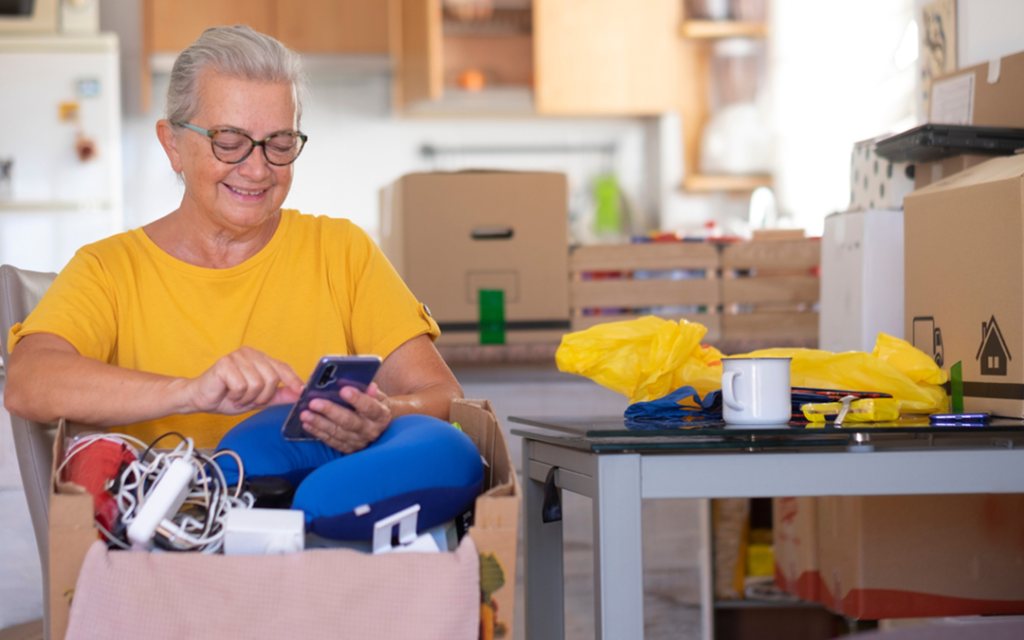Spring Cleaning for the Mind: The Empowering Effects of Decluttering

A clear and open space makes room for a clear and open mind. According to Dr. Emma Gray, a clinical psychologist, “Clutter can cause anxiety, depression, and even physical pain. Decluttering can improve the functioning of our brains and help us feel more in control of our lives.” Especially today, where we’re flooded with requests for our time and attention, being surrounded by physical clutter at home or work can intensify feelings of overwhelm and stress. Maybe this is why “spring cleaning” and decluttering are embraced around the world. As the days grow longer and warmer, it’s timely to clear clutter and create a peaceful and calming environment. And since decluttering can also positively impact mental health, this article offers basic decluttering tips for work and home.
Decluttering at Home
- Start small: Rather than trying to declutter everything at once, select a single area that is small enough to tackle in one sitting: a dresser (or a single drawer), a closet, etc. Tackling one manageable area at a time helps to build confidence and momentum.
- Mindfully sort: Take everything out of that manageable space and place it all in one spot. Then, one at a time, run each item through a set of criteria to determine if it will “stay” or “go.” You may be familiar with Marie Kondo’s iconic process of asking “Does this spark joy?” The reality is that each person and family lives in a different set of circumstances and many items that don’t spark joy may be necessary for their everyday living. This helpful list of questions can inform your own set of criteria by which you determine whether each of your items will STAY or GO.
- If STAY: Separate them into “store” (seasonal/special occasions) or “core” (crucial in current everyday space/use).
- If GO: Separate these into “sell” or “expel” (give away or throw away). If items still have value, practical usefulness, and beauty, donate or sell them. But – if items are broken, obsolete, shabby, or what you’d consider “junk” – throw them away.
- Invest in storage that works for your space. Cardboard boxes, baggies, and yogurt containers are not meant to be permanent storage containers, especially for everyday items. If the items selected for “core use” are truly worth keeping in the living space, they are worth being stored in a way that makes them organized, visible, and accessible. Baskets, clear bins, and shelves can transform a perpetually “messy house” into a place where everyone feels like they can breathe.
Decluttering at Work
Cluttered desks and overflowing inboxes can induce overwhelm and stress, decreasing productivity and focus. According to a study by the National Association of Professional Organizers, the average American wastes 55 minutes a day looking for things they can’t find. That’s more than 12 days a year! Here are some decluttering basics for the workplace:
- Clear your desk: Start by clearing your desk of all unnecessary items. Only keep the items that you use on a regular basis within arm’s reach. Following the same principles of sorting and purging from home decluttering, whatever core-use items remain on the desk should be organized, visible, and easily accessible.
- Organize all that paper: In settings that are not entirely paperless, paper can take over the environment quickly. Whether you are “piler” or “filer,” everyone needs a system for organizing their papers and documents so they can be found. Designating a place for everything will help you find things and keep your workspace uncluttered.
- Declutter digitally: Digital clutter can be just as overwhelming as physical clutter. To optimize workflow, delete unnecessary emails, files and apps from your computer and phone. According to organizing expert Peter Walsh, “Your digital space is just as important as your physical space. By keeping it organized, you can reduce stress and improve productivity.”
Devoting time to declutter your surroundings may seem like a sacrifice initially, but what may feel uncomfortable at first, can be therapeutic and invigorating. You may be surprised to discover the positive impact it can have on your mental well-being, including focus, energy, and empowerment, not to mention the occasional joy of rediscovery.
For those who want to dive deeper, here are 10 steps for decluttering in general, and a video challenge: 23 things to declutter in 2023.
About TLC
The Lincoln Center for Family and Youth (TLC) is a social enterprise company serving the Greater Philadelphia Area. Among its five divisions, TLC offers School-based Staffing Solutions, Mobile Coaching and Counseling, and Heather’s Hope: A Center for Victims of Crime. These major programs are united under TLC’s mission to promote positive choices and cultivate meaningful connections through education, counseling, coaching, and consulting.
About the Author
MaryJo Burchard (Ph.D. in Organizational Leadership) is co-founder and principal of Concord Solutions, a Virginia-based consultancy firm focused on helping leaders and organizations thrive while facing major disruption. Concord Solutions offers consulting, coaching, training, research, and keynote speaking surrounding trauma-informed leadership and assessing and building change readiness, trust, and belonging.